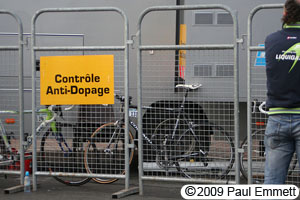 Now that the Tour de France is over, race organizers the Amaury Sports Organisation, are breathing a collective sigh of relief.
Now that the Tour de France is over, race organizers the Amaury Sports Organisation, are breathing a collective sigh of relief.
Why, one might ask?
Because this is the first Tour in years that has not been mired in a doping scandal.
That is all good and well, but French Anti-doping Agency president Pierre Bordry is not convinced that the blood doping junkies have been removed from the peloton.
Bodry told French paper Le Monde that he believes autologous blood transfusions are still going on behind closed doors. He also added that he is “convinced” that there are two new doping products, currently undetectable by tests, that were used by cyclists in the race. Both drug are unavailable on the market, but he is certain that they have made their way into the peloton.
AICAR (aminoimidazole carboxamide ribonucleotide), as reported before the 2008 Olympic games in Beijing, is best known as “exercise in a pill.” The drug has been proven to boost endurance in lab mice in the absence of actual training. It works by converting fast-twitch muscle fibers into more efficient slow-twitch fibers increasing a test subject’s endurance.
The World Anti-doping Agency does have the detection protocols for AICAR, but they have a “no comment” policy with respect to the implementation of additional doping tests.
The other drug Bodry is referring to is made by Affymax. Their product Hematide works similar to EPO but is a different molecule, so it will likely be undetectable by current testing methods. The drug is currently undergoing clinical trials.
Bordry also revealed that his agency found drug products in the trash thrown away by several of the teams. “We found several strong medications, including a substance which produces insulin and usually is used for diabetes.”
As with last year’s race, samples taken are being stored for future analysis as new detection methods are developed. So, for now, the 2009 Tour de France was “clean as a whistle”, but only time will whether the story will be rewritten.